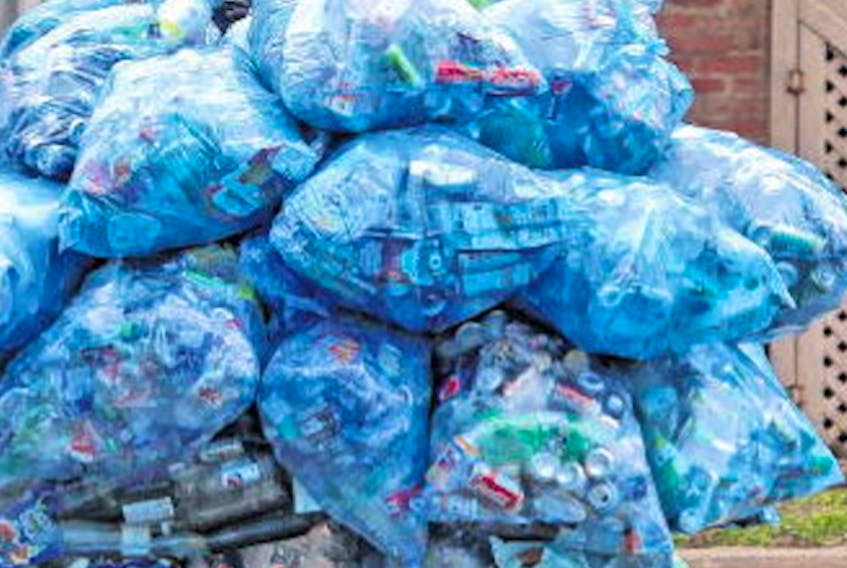For the past seven months, I have been participating in the City of St. John’s recycling program. Lest you think I was an environmental ignoramus, I happily paid a private company to collect my recyclables from 2005 until January 2019, when the company closed.
Every two weeks, just like the city, I placed my recyclables in the blue bag for pickup. So why pay for something very similar? What was different? Had I been paying needlessly for almost 14 years?
For starters, unlike the city, my recycling company picked up everything that could be recycled: plastic (all kinds, including bags), metal, the right sort of Styrofoam, milk cartons and — especially — glass. If it had a recycling symbol and a number, the company took it.

Secondly, I could bag everything together. I kept a special box for glass but otherwise it all went into the same sack. I could use blue bags or clear bags so long as they were see-through.
I was unpleasantly surprised in February to learn the city didn’t take glass (wine bottles and beer bottles can go to Green Depots, but everything else goes to the dump). I also learned that unless it was all properly categorized and sorted, it would be left at the curb. And only clear blue bags were allowed.
All things considered, the city’s program is not that bad, especially compared to having none at all. I also like the text option, which sends me reminders of what goes out when.
You can have garden waste and bulk waste picked up, too.
Still, I am sad. We had managed to get our curbside load down to a single, less-than-full bag each week with recycling and composting. These days it’s about a bag and a half.
It got me wondering if the city could do better to make it easier for citizens to recycle and reduce waste. Most hazardous waste, like paint, paint stripper or other chemicals, must be dropped off at the waste management depot. That means a car.
People who don't have a car are either dependent on someone else to drop off their waste or they just stick it in the garbage. Guess which option is more likely?
The city’s waste-management website is comprehensive. There’s a dandy search function where you can plug in the waste item you want to dispose of.
Again, you need to have a phone or laptop, internet service and the motivation to go looking. If you have a printer, you can copy off your own handy sticker, which gives you the highlights of recycling and waste rules.
Right, the rules.
I told you about the separation of recyclables, the no-glass, and blue bag only rules. On the city’s website where you learn how to recycle and manage your garbage, there are 42 points. Of those 42 points, 28 are rules.
Twenty-eight. That’s one for every day of the business week in a single month.
It got me wondering if the city could do better to make it easier for citizens to recycle and reduce waste. Most hazardous waste, like paint, paint stripper or other chemicals, must be dropped off at the waste management depot. That means a car.
Years ago, I attended an intensive seminar on social marketing so we could help people better in changing negative behaviours and adopting new, healthier ones.
The key messages I took away were these: make it simple. Make it easy. Make it affordable. Make it possible. Make it meaningful.
When I look at the city’s program, and I am grateful that after so many years of agitation we finally have one, it doesn’t meet those five principles consistently, and in some cases, not at all.
When it comes to recycling and redirecting waste, most people want to do the right thing.
Instead of investing $125,000 a year in a climate-change co-ordinator (the benefits of which have yet to be defined), I suggest the city reinvest money in making this program work for all citizens.
Look at the rules a good many can't abide by because of systemic barriers, which actively discourage participation.
If the city is truly committed to recycling and addressing climate and catastrophic environmental change, then recognize there is value in subsidizing appropriate disposal and repurposing of glass and other waste instead of burying it in a landfill.
Martha Muzychka is trying to live a greener, better life. Email [email protected]
MORE FROM MARTHA MUZYCHKA









